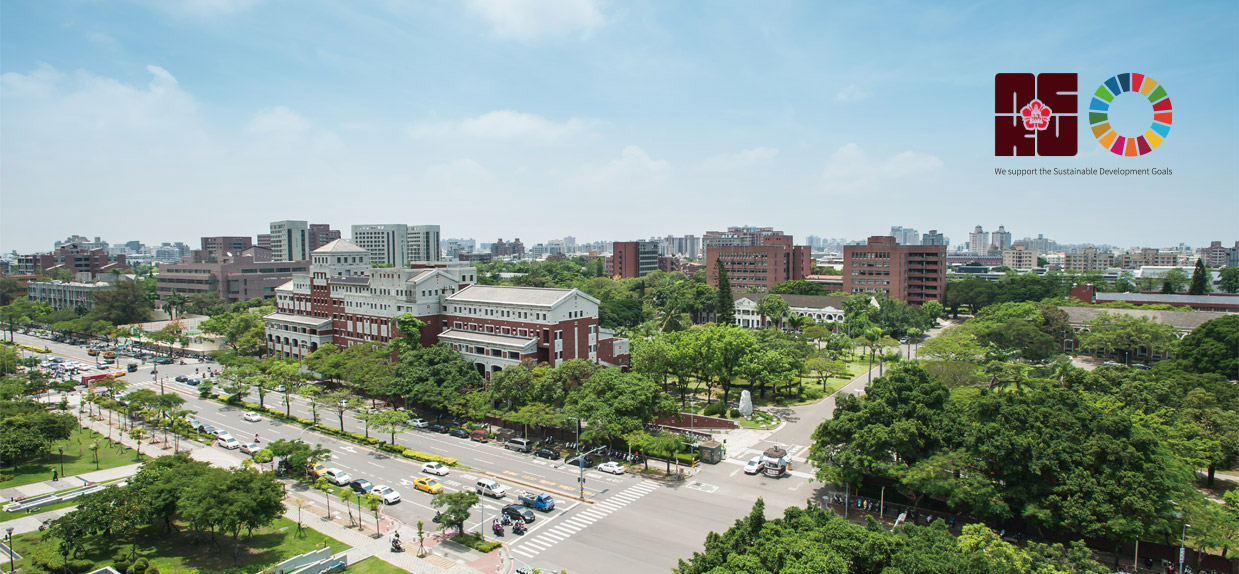Co-operative planning for climate change disasters
Climate Change and Water Disasters in Taiwan
Taiwan has long faced water and drought-related disasters. Climate change has made rainfall increasingly uneven, intensifying floods and droughts, with extreme weather events becoming more frequent in recent years. To address these challenges, National Cheng Kung University (NCKU) collaborates with local and central governments, as well as NGOs, to develop response plans and adaptation measures. The NCKU Disaster Prevention Research Center supports the Water Resources Agency by integrating existing disaster prevention and relief systems, assessing implementation outcomes, and proposing national strategies for water and drought adaptation technologies.
Enhancing Disaster Resilience
The center also focuses on strengthening societal resilience to diverse disasters, conducting risk assessments, and developing modern early-warning systems. Climate change–driven extreme events, combined with increased urban flood exposure, can raise “residual risks,” potentially leading to catastrophic outcomes if unaddressed.
Research and Workshops on Residual Flood Risks
To tackle this issue, NCKU’s Department of Hydraulic and Ocean Engineering organized a workshop on “Residual Risks of Extreme Floods.” The event gathered domestic and international scholars, experts, and government representatives to examine flood residual risks, integrating theory with practical considerations. Discussions focused on preparedness and response, risk communication, land use planning, building codes, and flood insurance before and after extreme flood events.
Bridging Knowledge and Policy
Through these initiatives, NCKU contributes to reducing vulnerability, improving disaster preparedness, and advancing science-based strategies for water and drought management, helping society better adapt to the increasing severity and frequency of climate-related disasters.
- NCKU Disaster Prevention Center - National Development Strategy for Flood and Drought Adaptation Technology
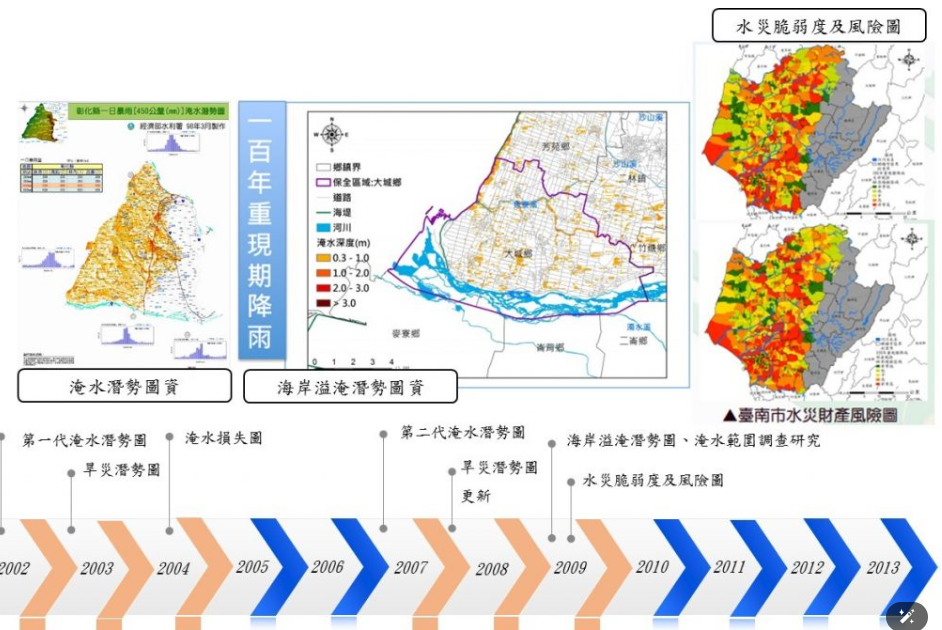 To respond to the increasing frequency and severity of disasters and climate change, NCKU has collaborated with local and central governments as well as non-governmental organizations to develop various plans and measures. NCKU Disaster Prevention Research Center assists the Water Resources Agency in integrating existing disaster prevention and relief systems and their implementation results, proposing a national development strategy for adaptation technologies related to water and drought disasters.
To respond to the increasing frequency and severity of disasters and climate change, NCKU has collaborated with local and central governments as well as non-governmental organizations to develop various plans and measures. NCKU Disaster Prevention Research Center assists the Water Resources Agency in integrating existing disaster prevention and relief systems and their implementation results, proposing a national development strategy for adaptation technologies related to water and drought disasters.
- NCKU Hosts International Short Course on Disaster Risk Management to Promote Taiwan-Malaysia Disaster Cooperation
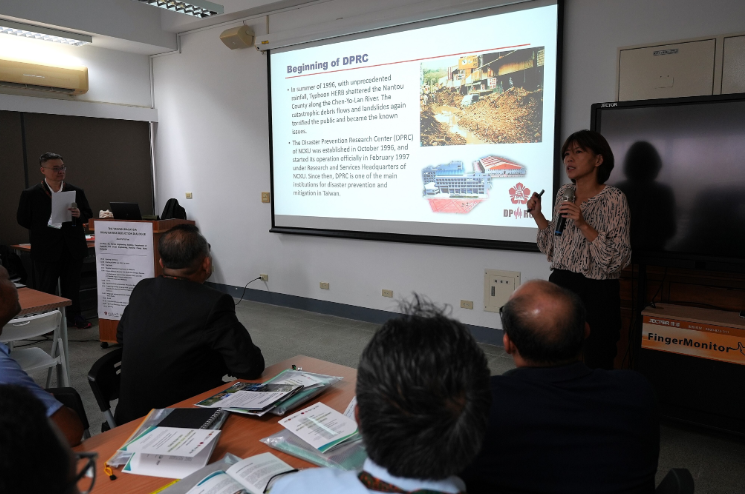 To promote regional disaster cooperation, NCKU hosted an International Short Course on Disaster Risk Management in 2024, inviting scholars, government officials, and industry representatives from Taiwan and Malaysia to share experiences and best practices in disaster management. The course covered risk assessment, response strategies, and post-disaster recovery planning, enhancing cross-border coordination capacity. This initiative not only strengthens talent cultivation but also underscores the importance of resilience and international collaboration.
To promote regional disaster cooperation, NCKU hosted an International Short Course on Disaster Risk Management in 2024, inviting scholars, government officials, and industry representatives from Taiwan and Malaysia to share experiences and best practices in disaster management. The course covered risk assessment, response strategies, and post-disaster recovery planning, enhancing cross-border coordination capacity. This initiative not only strengthens talent cultivation but also underscores the importance of resilience and international collaboration.
- NCKU Disaster Research Center Signs Memorandum of Understanding with Kumamoto University’s Water Cycle and Disaster Education Research Center
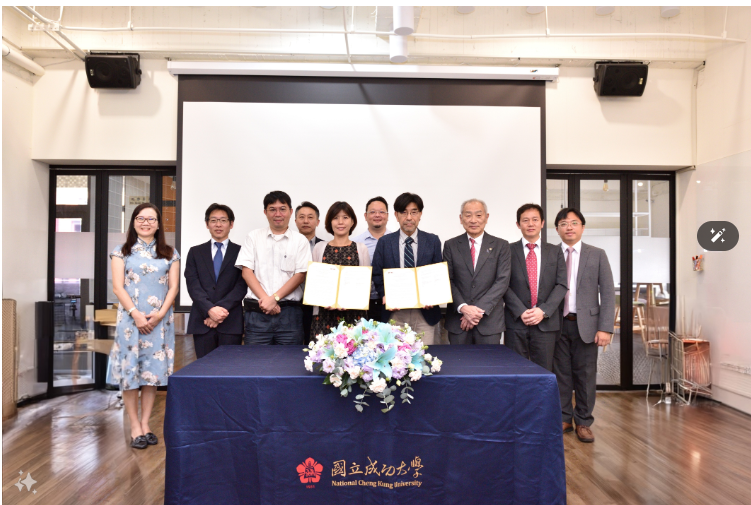 The NCKU Disaster Prevention Research Center has also actively expanded international partnerships, signing a Memorandum of Understanding with Kumamoto University’s Water Cycle and Disaster Education Research Center in Japan to collaborate on water resource management, disaster education, and technical exchange. This cooperation integrates data analysis, simulation technologies, and educational programs, cultivating disaster management professionals with an international perspective and promoting cross-border regional disaster planning and implementation.
The NCKU Disaster Prevention Research Center has also actively expanded international partnerships, signing a Memorandum of Understanding with Kumamoto University’s Water Cycle and Disaster Education Research Center in Japan to collaborate on water resource management, disaster education, and technical exchange. This cooperation integrates data analysis, simulation technologies, and educational programs, cultivating disaster management professionals with an international perspective and promoting cross-border regional disaster planning and implementation.
- Prime Minister Dlamini of the Kingdom of Eswatini Visits NCKU to Exchange Insights on Disaster Education and Risk Management Mechanisms.
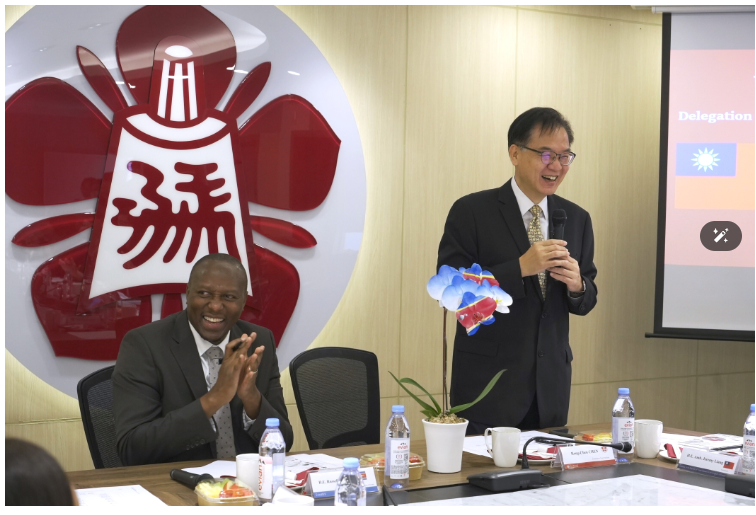 On the international exchange front, Prime Minister Dlamini of the Kingdom of Eswatini visited NCKU to share insights on disaster education and risk management mechanisms, discussing how education and institutional frameworks can enhance societal capacity to respond to extreme climate events. Such exchanges strengthen policy and technical communication while fostering collaborative approaches to climate challenges and enhancing resilience across nations.
On the international exchange front, Prime Minister Dlamini of the Kingdom of Eswatini visited NCKU to share insights on disaster education and risk management mechanisms, discussing how education and institutional frameworks can enhance societal capacity to respond to extreme climate events. Such exchanges strengthen policy and technical communication while fostering collaborative approaches to climate challenges and enhancing resilience across nations.
- NCKU Hosts the “International Workshop on Soil and Water Management and Resource Recycling” and the “International Conference on Sustainable Water Environments” , Aiming to Lead the Asia-Pacific Region in Sustainable Soil and Water Resource Utilization
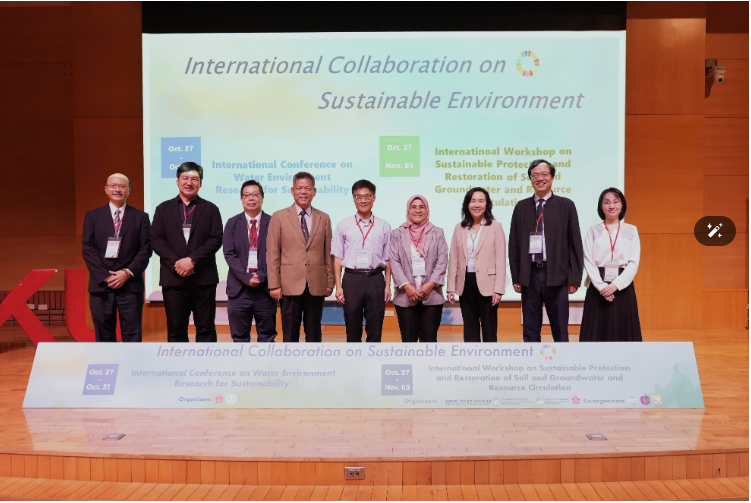 In 2024, NCKU hosted the “International Workshop on Soil and Water Management and Resource Recycling” and the “International Conference on Sustainable Water Environments,” attracting experts and young scholars from 13 countries. Focusing on sustainable soil and water management, pollution control, and circular reuse, the events enhanced resilience to climate change and extreme weather. Participants shared knowledge, promoted innovative solutions, and strengthened the Asia-Pacific region’s capacity for climate disaster prevention. Field visits and case studies enabled practical application of techniques, improving skills and strategic perspectives in resource management.
In 2024, NCKU hosted the “International Workshop on Soil and Water Management and Resource Recycling” and the “International Conference on Sustainable Water Environments,” attracting experts and young scholars from 13 countries. Focusing on sustainable soil and water management, pollution control, and circular reuse, the events enhanced resilience to climate change and extreme weather. Participants shared knowledge, promoted innovative solutions, and strengthened the Asia-Pacific region’s capacity for climate disaster prevention. Field visits and case studies enabled practical application of techniques, improving skills and strategic perspectives in resource management.
- NCKU Disaster Prevention Research Center
The Disaster Prevention 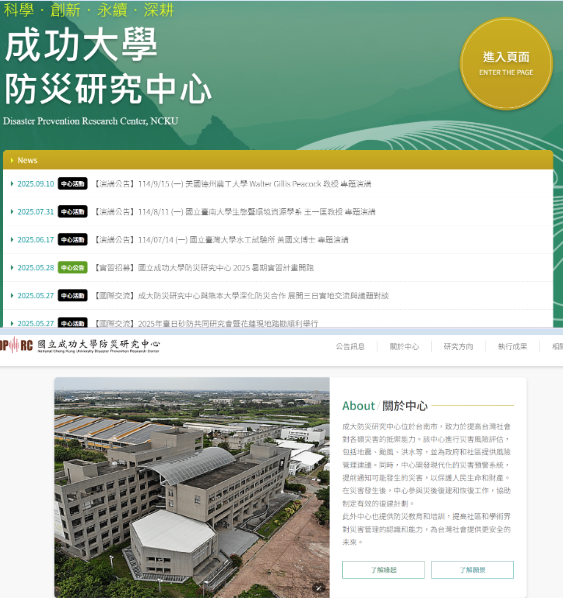 Center of NCKU assisted in formulating the "National Development Strategy for Flood and Drought Adaptation Technology" and establishing the "Disaster Preservation Plan Information Service Network". Through cooperation with governments at all levels and the Water Resources Agency of the Ministry of Economic Affairs, in addition to developing an early warning system and an integrated disaster prevention information system at the county and city level, which provides real-time warning information and reference for emergency decision-making, it also establishes a service network to publicize the Potential Flooding Map and the Flood Protection Plan of all counties and cities in Taiwan starting from 2019, providing credible and reliable research and reference materials for official and private institutions.
Center of NCKU assisted in formulating the "National Development Strategy for Flood and Drought Adaptation Technology" and establishing the "Disaster Preservation Plan Information Service Network". Through cooperation with governments at all levels and the Water Resources Agency of the Ministry of Economic Affairs, in addition to developing an early warning system and an integrated disaster prevention information system at the county and city level, which provides real-time warning information and reference for emergency decision-making, it also establishes a service network to publicize the Potential Flooding Map and the Flood Protection Plan of all counties and cities in Taiwan starting from 2019, providing credible and reliable research and reference materials for official and private institutions.

